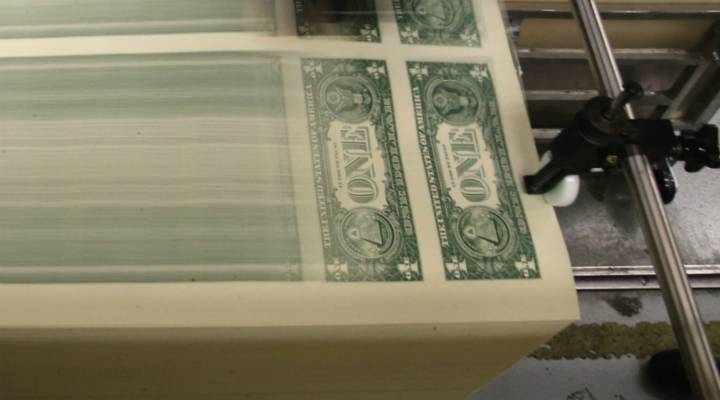
Businesses are saving time and money by getting rid of cash
Businesses are saving time and money by getting rid of cash

Visa wants small businesses to go cashless. The company has announced a promotion that will give $10,000 to 50 restaurants, cafes and food trucks as long as they swear off currency. There already are a number of businesses that have stepped away from cash; you can’t order drinks or earbuds on an airplane with making payment on a card, for instance. There are lots of reasons for this, including security and efficiency.
Another business to make the switch is the salad chain Sweetgreen, which has gone cashless at most of its restaurants, including the one in midtown New York where Isabel Bingham was waiting in line for a salad. Did she know that Sweetgreen was cashless?
“Couchless? Oh, cashless! Oh, I did not know that,” she said. She never noticed the “No Cash(ew) Money” signs posted near the entrance and never had an issue since she usually pays for her salad with her debit or credit cards. “I almost never use cash or have cash on me. That’s convenient for me, actually. I think credit cards are faster to pay with, in general. You swipe, and you don’t have to count out the dollar amount or ensure that you have the dollar amount on you at the time.”
Lauren Wong, who was waiting further down the line, also did not know that Sweetgreen was cashless. She had visited the store a couple of times before. She, too, thinks that paying with credit card is faster.
“This is a long line, so I hope it helps,” she laughed.
When Sweetgreen first tested going cashless, it found that its employees “were able to do 5 to 15 percent more transactions an hour, which means guests were in and out several minutes faster in a cashless store than one that accepts cash,” Sweetgreens founders wrote in December when they announced that the company was going almost cashless. (Sweetgreen still accepts cash in Massachusetts as required by state law.)
There are a lot of good reasons for legit, tax-paying businesses to go cashless. Cash takes time and attention. It costs money to count it, move it and guard it.
“Stopping cash pilferage by your employees is actually tricky business,” said Kenneth Rogoff, an economics professor at Harvard University. “It also raises the cost of insurance. If you are carrying lots of cash in your till, you are more likely to be robbed and your insurance will be higher.”
According to Sweetgreen, cash management — regardless of the amount of cash — took two hours a day per store.
Still, there are many companies across the country that aren’t eager to make the switch to cashless for their own good reasons. Some have customers without access to a bank. The Federal Deposit Insurance Corp. estimates that about 7 percent of U.S. households are unbanked. What’s more, some businesses have an older set of customers, who might feel less comfortable using an app to pay for their salad or a cup of coffee. Those businesses will also keep accepting cash.
There are also some small business that only accept cash. Wong, the Sweetgreen customer, said such stores are the reason why she now started carrying cash.
“I didn’t until I moved to New York. There are so many small shops that are cash only, so I always try to keep some in my wallet, but I run out all the time,” she said. “To me, being just credit card than just cash is much more appealing.”
Preference between paying with cash or credit could come down to age.
“There’s a whole notion of generationality around cash,” according to Ravi Shankar Chaturvedi, a research fellow at the Fletcher School at Tufts University. He said if you look at the world from the eyes of an entering college freshman, “cash is something that she probably associates with her grandparents.”
Which might help explain that couch-less misunderstanding.
Additional reporting by Kristin Schwab.
| When can we stop using cash? |
| PayPal’s Schulman says the future may not be cashless, but it’s definitely mobile |
Correction (July 13, 2017): A previous version of this story misstated the day of Visa’s announcement. The text has been corrected.
There’s a lot happening in the world. Through it all, Marketplace is here for you.
You rely on Marketplace to break down the world’s events and tell you how it affects you in a fact-based, approachable way. We rely on your financial support to keep making that possible.
Your donation today powers the independent journalism that you rely on. For just $5/month, you can help sustain Marketplace so we can keep reporting on the things that matter to you.












